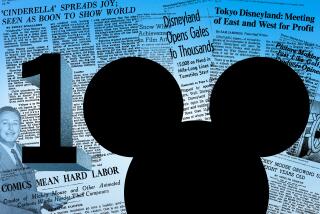Disney’s Purchase of Baby Einstein Seen as Intelligent Move
- Share via
LONE TREE, Colo. — In the corner suite of a two-story office building in suburbia, the imagination of Baby Einstein founder Julie Aigner-Clark runs wild.
She giggles as she winds up toy chicks that hop across a makeshift stage in a warehouse filled with dolls and puppets.
The chicks’ jerky movements become a dance to the staccato pace of the “William Tell” Overture on a video. In another, Aigner-Clark reads poems that are dubbed over scenes of twirling tops and painting puppets. In a third, characters bob to alphabet chants in several languages.
Baby Einstein educational videos are designed to teach infants and young children human expression, including language, art and music, as well as concepts. They’ve caught the attention of Walt Disney Co., which purchased the homespun business in November for an undisclosed amount.
Media analyst David Miller of Sutro & Co. said the two companies complement each other. “It’s family-oriented, educational, and that really is the Disney brand right there,” he said.
Aigner-Clark, 35, graduated from Michigan State University with a major in English and moved to New Jersey to teach middle school and high school.
When she quit her job to be a stay-at-home mom for her first daughter, Aigner-Clark found her hectic life left her little time to herself. She came up with the idea of a video to occupy her infant while she made a phone call or took a shower.
While living in Atlanta in 1997, she cobbled together the first video, “Baby Einstein,” in her basement using personal savings and a producer she found in the Yellow Pages.
“It was literally me pushing ‘play’ on the Beta Cam and dragging a cat across a table with fishing line,” she said.
She first pitched “Baby Einstein” to CNN. The basement-produced video soon was selling in Japan via CNN’s Web site and at Right Start, a chain of specialty toy stores.
A year later, customers clamoring for more convinced Aigner-Clark to produce a second video called “Baby Mozart,” later adding “Baby Bach,” “Baby Shakespeare” and “Baby Van Gogh.”
Her husband, Bill Clark, was working for a Michigan-based company designing elementary school science curricula before he began helping with the financial aspects of Baby Einstein.
Video sales hit $100,000 in the first year, and the company grew by more than 4,000% in less than three years.
In 2000, Baby Einstein sales topped $11 million; projected revenue for 2001 is $17 million.
Today, the collection includes seven videos, DVDs, flashcards, toys and board books. To date, more than 3 million items have sold.
“I guess I just hit on an idea that nobody had come up with, or they didn’t know how to do it,” Aigner-Clark said.
Baby Einstein will remain a separate brand, said Disney spokesman Russell Hampton, who will become Baby Einstein’s manager.
Disney plans to create a Little Einstein series targeting 2- to 5-year-olds as well as a daily TV show and more board books, he said. Disney plans to retain Aigner-Clark and her husband as consultants.
More to Read
Inside the business of entertainment
The Wide Shot brings you news, analysis and insights on everything from streaming wars to production — and what it all means for the future.
You may occasionally receive promotional content from the Los Angeles Times.









